I could have continued my run
FOR ENGLISH; PLEAE SCROLL DOWN
Den lille fisker landsbyen Kigungu
Juliets historie
Her er historien om en bitteliten fisker-landsby som det egentlig er rart at jeg fant. Den ligger gjemt på en halvøy utenfor rullebanen til Entebbe Internasjonale flyplass. For å komme dit må man passere gjennom utallige både militære sjekk-poster og politi vakttårn og sjekk-poster, helt til man kommer til den siste politi-stasjonen som nesten er som en inngangsport til landsbyen.
Men jeg skulle jo løpe rundt flyplassen, og det hadde jeg jo bestemt meg for, og så ble jo min oppmerksomhet fanget av lille funksjonshemmede Ntabazi, og siden den dagen har jeg vært på besøk i landsbyen mange ganger.
Hvordan er det så på denne lille plassen, så avskåret fra resten av verden?
Hvordan har egentlig Juliet’s familie det, og hvor stor er den egentlig?
Hva lever de av, og hvilken rolle spiller politiet her?…de patruljerer jo svært ofte i sine skinnende pickup’er…
Her skal jeg prøve å gi dere et bilde på hvordan det er i en sikkert ganske så normal liten landsby litt avskåret fra det meste utenfor allfarvei i Uganda.
Juliet’s søster Mastula, tar meg hjertelig imot når jeg kommer på overraskende besøk en lørdag formiddag. Barna Enock og Eric kommer løpende mot meg og hopper opp på meg; for en hærlig velkomst! Ntabazi og Edrine sitter inne i skuret bøyd over fulle tallerkner, de kikker opp og gliser med munnen full av bønner og ris. For et nydelig syn; de sitter midt oppi fillene i det falleferdige skuret og er lykkelige over den store tallerken mat de har fått. det gjør meg så inderlig glad!
Mastula forklarer meg at Juliet har kokt mat til dem alle, og er nå hos deres mor for å gi mat til henne. Det er utrolig flott å se hvordan samfunnet her tydeligvis er vant til å dele på det lille man har. Det ligger virkelig i ryggmargen deres;
Juliet hadde allerede startet sitt lille bakeri, og foran hennes skur stod det nå et vaklevorent bord med en sprukket plastbøtte med smult-boller oppi. Disse var til salgs for 40 øre stykket. Jeg kjøpte 10 stk og delte dem ut til barna. Og det var så utrolig flott å se hvordan de delte opp sin egen lille smult-bolle og gav de små bitene til andre barn som ikke hadde fått.
Her tror jeg det ikke bare drypper på klokkeren, men det fosser ned på klokkeren når det regner på presten. Og nå som Juliet hadde fått ris og bønner, så kokte hun til hele stor-familien, og til naboene.
Her var det visst mye som foregikk uten at noen satt et kritisk blikk på deres situasjon.
Vi kom frem til bestemor, som satt og solgte garn-staur til fiskerne. Hun satt der med tre barnebarn kravlende rundt seg. Det var jentene til Juliets andre søster, Namale. De var 5 måneder, 3 år og 5 år. Bestemor forteller meg at hun har 5 jenter. To av dem er gift, har barn og bor med sine menn utenfor denne landsbyen. Her bor hun sammen med Namale (27), hennest tre jenter og Mastula (15). Hun viser meg et bittelite krypinn i et murhus. Her er en trippel-køye og en seng, og det er alt. Ikke et vindu engang. Men en dør full av hull, og ingen elektrisitet, bare et bittelite stearinlys. Egentlig bodde Juliet og hennes fire gutter her også, men bestemor’s helse klarte ikke det lenger, så hun ba Juliet om å flytte ut, og slik var det jeg bumpet oppi Juliet og hele denne historien.
Min neste oppgave nå blir å få til et møte med jurist for å få klarlagt et ryddig kjøp av et lovlig stykke jord, samt få satt opp et lite hus til hele stor-familien. Bestemor er satt på saken med å finne et stykke jord, og prisen på det. Hun er lur, og har forstått at her skal Muzungu (=“hvit mann”) holdes utenfor slik at vi får mest mulig for pengene.
La oss se hva vi får til, jeg har et håp om å kunne gjøre en forskjell for dem :)
The small fisherman's village Kigungu
Juliet's story
Here is my story about the small fisherman’s village Kigungu. It is nearly strange that I found it as it is hidden on a peninsula outside of the runway to Entebbe International Airport, Uganda. To get there, you have to pass through countless military checkpoints and police watch towers and checkpoints, until you reach the last police station which is almost like a entry gate to the village.
But I wanted to do my run around the airport, and I had decided to do so, and then my attention was caught by little disabled Ntabazi, and since that day I have been visiting the village many times.
But how is it here; this little place so cut off from the rest of the world? How does Juliet's family really do, and how big is this family really? How do they survive and what role do the police play here? ... they patrol very often in their shiny pickups ...
I will try to give you a picture of what this life is like here, in a most likely normal village, but totally cut off from the rest of the world, and totally off the grid.
Juliet's sister Mastula, warmly welcomed me when I came on a surprise visit last Saturday morning. The kids Enock and Eric came running towards me and jumped onto me; what a wonderful welcome greeting!
Ntabazi and Edrine were sitting inside the shed bowed over their plates, they look up and grinned with their mouth full of beans and rice. What a beautiful sight; they sat on top of some worn out blankets in the middle of this ramshackle shed and were so happy about the big plate of food they had received. This sight made me so happy! Mastula explained that Juliet had cooked food for all of them, and was now with her mother to give her food.
It's amazing to experience how this community is used to share every single little thing they get.
Juliet had already started her little bakery, and in front of her shed there was now a little table with a plastic bucket full of donuts. She sold them for 5 cent per piece. I bought 10 pieces. I paid triple price…I told them I had to pay “muzungo-price”. They laughed!!!
I did what I just had learned by seeing how they shared everything, so I gave them all away to the kids. And it was so amazing to see how they split their own little donut and gave the little pieces to other children again.
Juliet came running down the dusty dirt road with open arms to welcome me. She proudly showed me how she had divided up small piles of charcoal which she sold in front of her little shed. She told me that she had sold both bread, donuts and charcoal every day now. The sister interrupted and explained that "it depends a bit on how the fishermen are treated." Hmmm ... I had to dig a little deeper into this.
They pointed to a pickup full-load with armed police and signalled that we would talk about this later.
They asked me if I wanted to come with them and visit grandma; Yes of course! We walked down the red, dusty dirt road while the pickup with the armed policemen drove slowly past us.
Mastula started talking again. She is 15 years old and has spent one year at high school. She is a little more bold than the others and started telling about the police's role in the village.
Briefly summarized: the police have full control over this village and "money talks".
When the fishermen are coming in with the fish early in the morning, the police are standing at the harbour and controlling the fish. And it varies from day to day which size or weight that is accepted. And nearly every day the police found a reason to confiscate the fisherman’s catch, their boat or imprison a fisherman. And nothing or no-one are released without money being paid. And this money goes straight into the pocket of the police.
Mastula also told me that the police are hitting the fishermen and that there is a reason why some of the children in this village have no father…
There is certainly a lot going on here without any critical eyes monitoring this situation.
We arrived at Grandma’s place; she was sitting outside her little shed selling long wooden sticks used by the fishermen to put out their net. She sat there with three grandchildren crawling all around her. These were the girls of July's second sister, Namale. They were 5 months, 3 years and 5 years old. Grandma tells me that she has 5 daughters. Two of them are married, have children and live with their husbands outside this village. And here she lives with Namale (27), her three girls and Mastula (15). She shows me a tiny room where they have made their home. Inside the room is a triple bunk bed and a single bed and that's all. Not even a window. No electricity, just a tiny little candle, and a door full of holes.
In fact Juliet and her four boys also used to live here, but Grandma's health couldn't bear it any longer, so she asked Juliet to move out,… and that is how I bumped into Juliet and this whole story.
My next move now will be to arrange a meeting with a lawyer to find out how to be sure we have a legal agreement about buying a piece of land and write legally applicable contract, so that no-one can come and question her property. Yes, I will try to buy a piece of land and make sure they also get a little house for the big family. Grandma is determined. She is working together with me and will find a piece of land, and find out the price of it. She is a clever old lady, and are keeping the Muzungu (= "white man") out of this so we get best value.
Let's see what we get and where we go, I hope to make a difference.
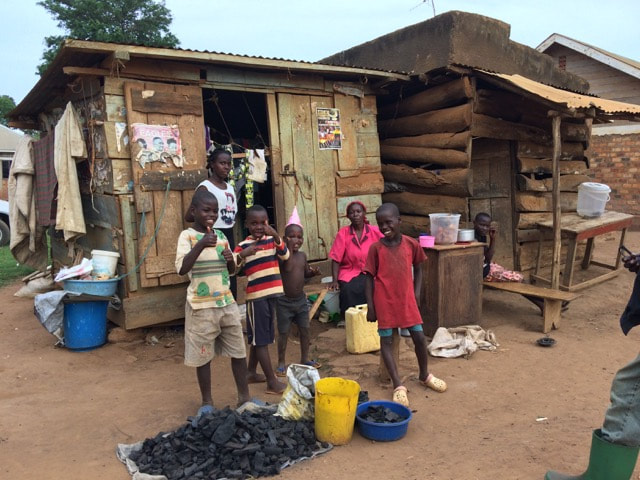
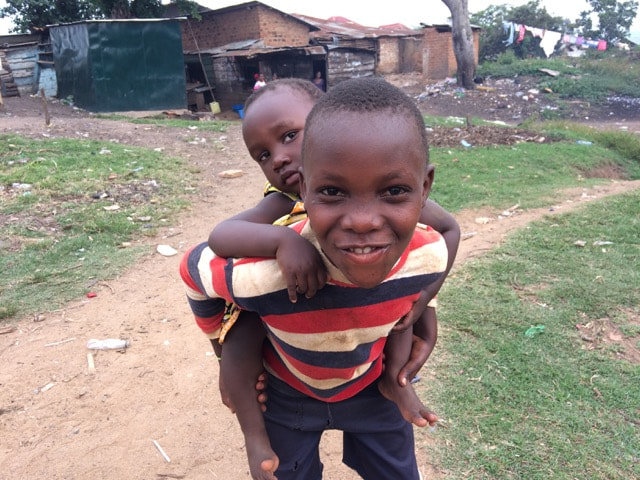
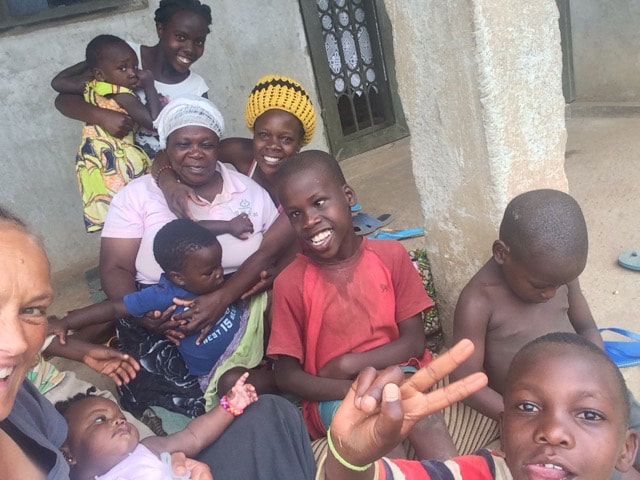
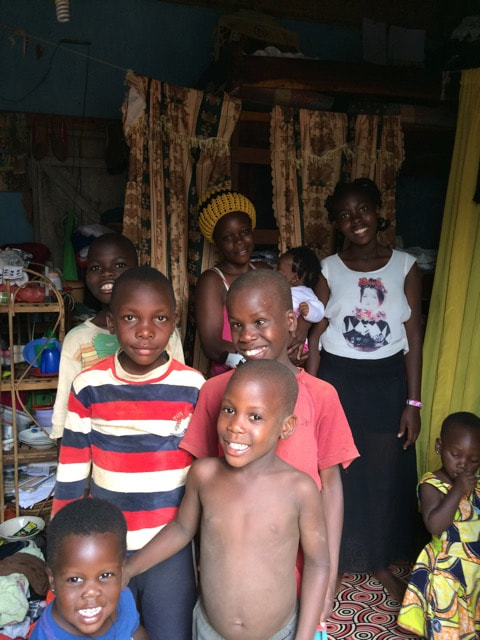
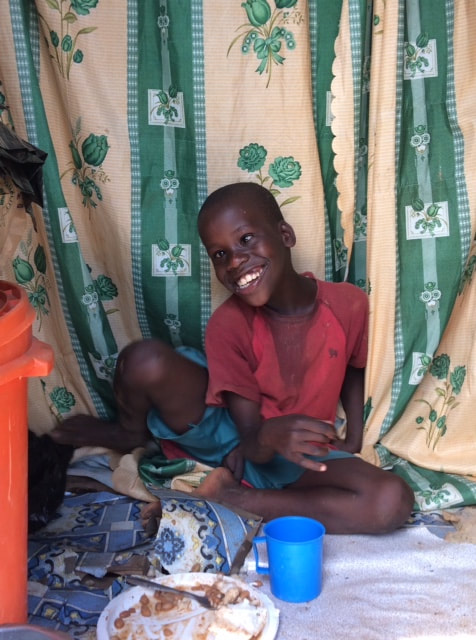
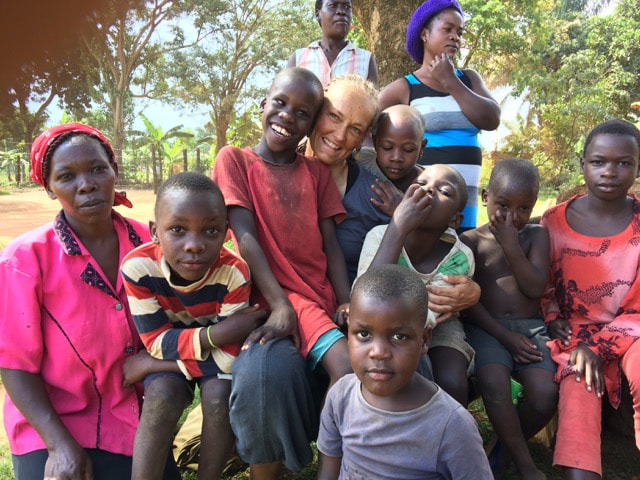
 RSS Feed
RSS Feed
